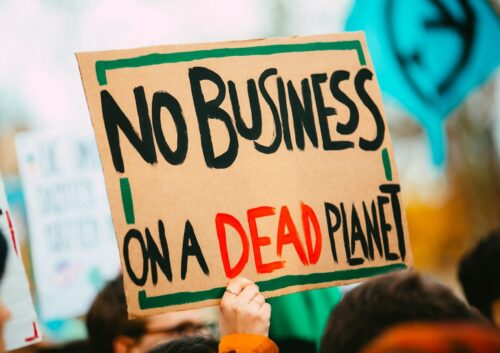
Introduction: A Distorted Climate Narrative
A recent study published in Science Advances has been co-opted by mainstream media (MSM) to fuel a climate panic narrative. [emphasis, links added]
Headlines warn of catastrophic heat-related deaths, particularly targeting younger generations. What these headlines omit is equally, if not more, important: the study also reveals an overwhelming decline in cold-related deaths, resulting in a net decrease in temperature-related mortality under all scenarios.
This omission is no accident. It’s part of a broader strategy to perpetuate fear, distort public understanding, and bolster funding and policy agendas.
The actual data tell a very different story, one that the climate fear machine cannot afford to let you see. Let’s dissect the study, expose the selective reporting, and uncover the truth.
Media Spin: “Climate Change Is Coming for the Young”
Media outlets and social media platforms have latched onto the study’s heat-related mortality projections, ignoring the broader context. For example:
- The Guardian proclaimed that “people aged under 35 are set to suffer the brunt of heat-related deaths,” painting a dire picture for future generations.
- NPR emphasized heightened risks to young people, portraying heat-related deaths as an escalating crisis while failing to mention the study’s findings on cold-related mortality.
- Social Media influencers and activists are flooding platforms like X and TikTok with posts claiming that climate change is sentencing Gen Z and millennials to early deaths.
The result is a lopsided narrative that amplifies fear without providing context. By focusing solely on heat-related deaths, the media suppresses the study’s broader and more optimistic findings.
What the Data Shows
The study’s figure breaks down annual deaths due to heat (top panel) and cold (bottom panel) under various GHG emission scenarios.

Here’s the key takeaway: the reduction in cold-related deaths vastly outweighs the increase in heat-related deaths.
HEAT-RELATED DEATHS: Heat-related mortality is projected to rise, particularly among older populations (70+) as warming increases the frequency of heat waves. However, these increases are relatively modest and concentrated in specific vulnerable age groups.
COLD-RELATED DEATHS: In contrast, cold-related deaths—historically far more common than heat deaths—are projected to decline dramatically across all scenarios. This decline is most pronounced in older populations, who are at the greatest risk of cold-induced conditions like cardiovascular and respiratory illnesses.
NET MORTALITY: The overall picture is clear: fewer people will die from temperature extremes in a warmer world. The reduction in cold deaths consistently outweighs the increase in heat deaths across all scenarios.
The Historical Context: Cold Is Far Deadlier Than Heat
This study isn’t an outlier; it aligns with decades of research showing that cold is far deadlier than heat. A 2021 global analysis in The Lancet revealed that cold exposure causes nearly 4.6 million deaths annually, compared to just 0.5 million from heat.
Cold-related deaths are primarily driven by respiratory and cardiovascular conditions aggravated by low temperatures, as well as insufficient heating in homes. With warming, these risks are expected to decline significantly, leading to tangible public health benefits.
The Fear Machine: How the Narrative Gets Distorted
The media’s selective reporting exemplifies how climate fear is manufactured and monetized. Here’s how it works:
- Cherry-Picking Data: MSM focuses exclusively on heat-related deaths, ignoring the dramatic reduction in cold deaths that paints a more optimistic picture.
- Worst-Case Scenarios: The extreme SSP5–8.5 emissions scenario, widely regarded as unlikely, is the default future to inflate perceived risks.
- Fear as a Funding Tool: Alarmist headlines sustain public support for massive climate funding, benefiting media outlets, advocacy groups, and research institutions.
- Suppression of Context: The net benefits of warming, such as fewer overall temperature-related deaths, are ignored because they undermine the fear-driven narrative.
This approach isn’t about informing the public but controlling the conversation.
Irrational Fear is written by climatologist Dr. Matthew Wielicki and is reader-supported. If you value what you have read here, please consider subscribing and supporting the work that goes into it.
Top photo by Tiff Ng via Pexels
Read rest at Irrational Fear






















Much better than Lancet as this is worldwide not just Europe. More complete in scope.
https://thebreakthrough.org/issues/energy/human-deaths-from-hot-and-cold-temperatures-and-implications-for-climate-change
The Garbage Can(Guardian)is becoming as bad as the NYT’s and WP for spreading False News
Gullibility and cognitive dissonance seem to go together. Canadians love warmth, but somehow a bunch of them fear climate change. That “bunch” are trolling the internet for climate change “denialism”. Censorship! Desperate NGO’s are pushing for laws against climate change debate. I hear the death rattle in their pronouncements.
Yeah, if the facts are on your side you don’t need to squelch the speech from those who oppose you and your facts. That they want to shut down debate and call anyone who disagrees with them denialists then it’s because they can’t argue on the facts.
Less news then it is leftists Propaganda more reasons to totally Boycott the M.S. Media Bottom Feeders and Gutter Dwellers